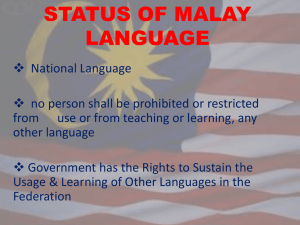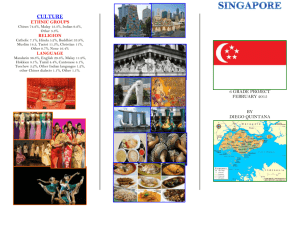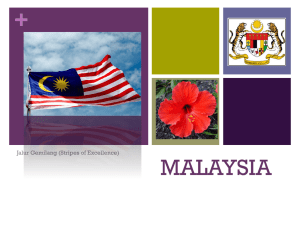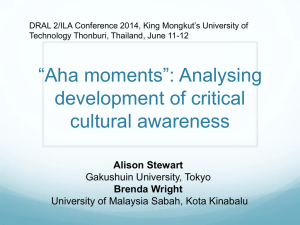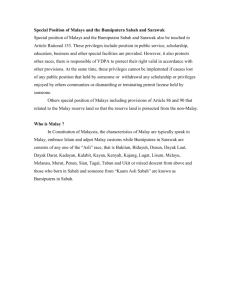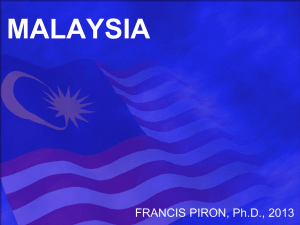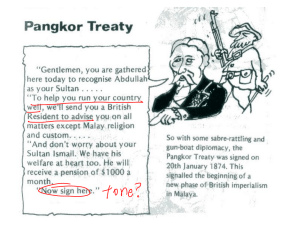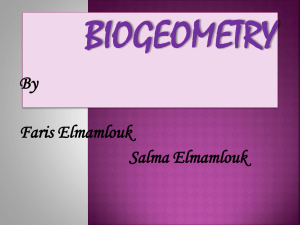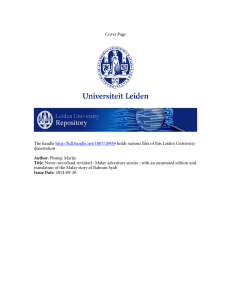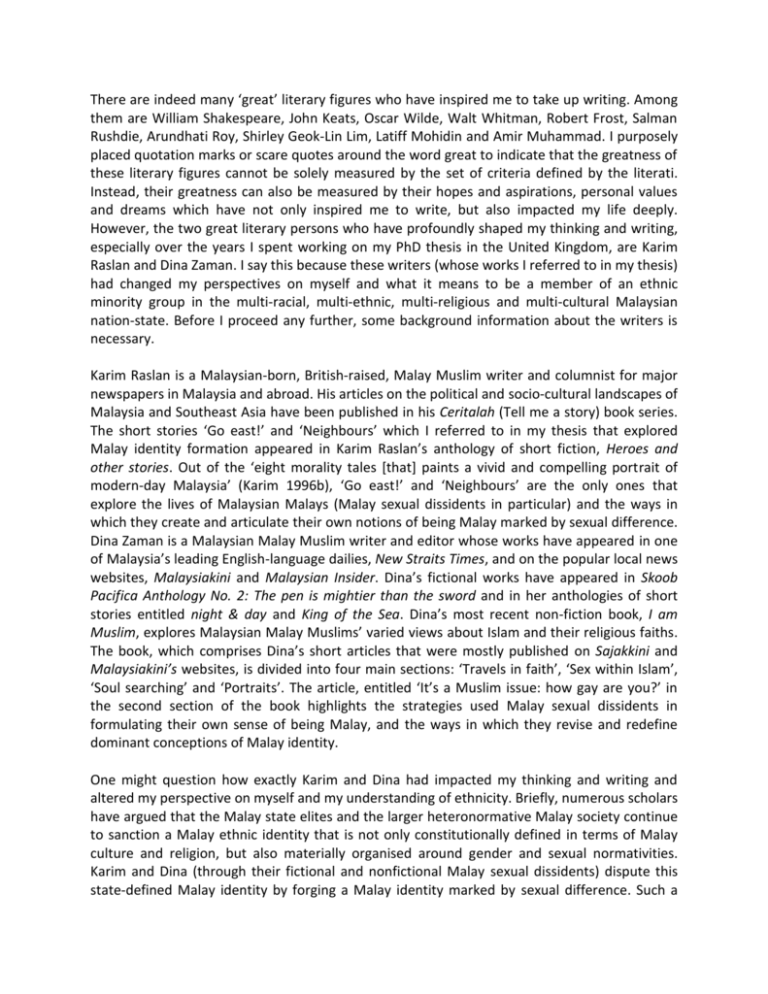
There are indeed many ‘great’ literary figures who have inspired me to take up writing. Among
them are William Shakespeare, John Keats, Oscar Wilde, Walt Whitman, Robert Frost, Salman
Rushdie, Arundhati Roy, Shirley Geok-Lin Lim, Latiff Mohidin and Amir Muhammad. I purposely
placed quotation marks or scare quotes around the word great to indicate that the greatness of
these literary figures cannot be solely measured by the set of criteria defined by the literati.
Instead, their greatness can also be measured by their hopes and aspirations, personal values
and dreams which have not only inspired me to write, but also impacted my life deeply.
However, the two great literary persons who have profoundly shaped my thinking and writing,
especially over the years I spent working on my PhD thesis in the United Kingdom, are Karim
Raslan and Dina Zaman. I say this because these writers (whose works I referred to in my thesis)
had changed my perspectives on myself and what it means to be a member of an ethnic
minority group in the multi-racial, multi-ethnic, multi-religious and multi-cultural Malaysian
nation-state. Before I proceed any further, some background information about the writers is
necessary.
Karim Raslan is a Malaysian-born, British-raised, Malay Muslim writer and columnist for major
newspapers in Malaysia and abroad. His articles on the political and socio-cultural landscapes of
Malaysia and Southeast Asia have been published in his Ceritalah (Tell me a story) book series.
The short stories ‘Go east!’ and ‘Neighbours’ which I referred to in my thesis that explored
Malay identity formation appeared in Karim Raslan’s anthology of short fiction, Heroes and
other stories. Out of the ‘eight morality tales [that] paints a vivid and compelling portrait of
modern-day Malaysia’ (Karim 1996b), ‘Go east!’ and ‘Neighbours’ are the only ones that
explore the lives of Malaysian Malays (Malay sexual dissidents in particular) and the ways in
which they create and articulate their own notions of being Malay marked by sexual difference.
Dina Zaman is a Malaysian Malay Muslim writer and editor whose works have appeared in one
of Malaysia’s leading English-language dailies, New Straits Times, and on the popular local news
websites, Malaysiakini and Malaysian Insider. Dina’s fictional works have appeared in Skoob
Pacifica Anthology No. 2: The pen is mightier than the sword and in her anthologies of short
stories entitled night & day and King of the Sea. Dina’s most recent non-fiction book, I am
Muslim, explores Malaysian Malay Muslims’ varied views about Islam and their religious faiths.
The book, which comprises Dina’s short articles that were mostly published on Sajakkini and
Malaysiakini’s websites, is divided into four main sections: ‘Travels in faith’, ‘Sex within Islam’,
‘Soul searching’ and ‘Portraits’. The article, entitled ‘It’s a Muslim issue: how gay are you?’ in
the second section of the book highlights the strategies used Malay sexual dissidents in
formulating their own sense of being Malay, and the ways in which they revise and redefine
dominant conceptions of Malay identity.
One might question how exactly Karim and Dina had impacted my thinking and writing and
altered my perspective on myself and my understanding of ethnicity. Briefly, numerous scholars
have argued that the Malay state elites and the larger heteronormative Malay society continue
to sanction a Malay ethnic identity that is not only constitutionally defined in terms of Malay
culture and religion, but also materially organised around gender and sexual normativities.
Karim and Dina (through their fictional and nonfictional Malay sexual dissidents) dispute this
state-defined Malay identity by forging a Malay identity marked by sexual difference. Such a
nuanced sense of self and ethnicity has a deep resonance with my own struggles in identifying
and realigning myself in relation to others within and beyond my ethnic group. This is
particularly true of the difficulties I personally experience in identifying myself as universityeducated and secular middle class man in my Bidayuh ethnic community, which, like the Malay
Muslim community, places immense emphasis on cultural, religious, and communal values, in
addition to heteronormativity in formulating a culturally authoritative notion of Bidayuh
identity. I have been called many times and on various nama jak Bidayuh (Bidayuh only in/by
name) and Bidayuh murtad (no longer a Bidayuh) for failing to adhere to and exemplify
dominant conceptions of Bidayuh-ness simply because social class and educational background
are important components in the process of my own ethnic self-identification. Writing about
sexually dissident Malays who are featured in the writers’ works has enabled me to think about
other ethnic subjects and individuals whose sense of self and identities do not fit dominant
notions of race, ethnicity, gender, sexuality and so on.
While there is already a body of literature that investigates the formation of dissident Malay
identity in present-day Malaysia (see for example Kahn, 2006) and a growing number of
publications on dissident sexualities in Malaysia (see for example Kugan & Phang, 2006), I
personally think that Karim’s short stories and Dina’s non-fiction writing had compelled me to
rethink not just the way I write about the subjects of my thesis (Malay sexual dissidents in
particular), but also the way I perceive myself as an ethnic subject. This is mainly because both
writers are often resented by the larger Malay community on the grounds that they challenge
the dominant notions of ethnicity by writing about non-normative sexualities and Malay sexual
dissidents (Tope 2010: 98). This is germane in the way Karim portrays highly mediated
representations of queer Malays while Dina discusses real people talking for others and about
themselves. Despite their varied depictions of their Malays subjects, both writers draw from
their own knowledge and experience, and use narrative conventions to write about the lives of
Malay sexual dissidents. Dina, for instance, uses dialogues, settings and characterisation in
narrating the lives of her gay and lesbian Malay informants. By using the first person
perspective, Dina participates in the narration by providing details and examples based on her
own experience of meeting and befriending queer Malays in Kuala Lumpur and beyond. Karim,
on the other hand, also utilises narrative conventions in crafting stories about gay, bisexual and
transgendered Malays. Although Malays in Karim’s short stories are highly mediated
representations, he draws upon his sheer understanding of the ways of life in Kuala Lumpur and
Sabah (see Karim 1996a) in crafting realistic dialogues, familiar settings (e.g. upper class
neighbourhood, plantation household) and life-like characters (e.g. nosey and gossipy
neighbour, dutiful and obedient servants) and the tensions and conflicts experienced by his
characters which local readers like myself can relate to. Karim and Dina’s use of narrative
conventions has allowed me to explore and examine how queer Malays featured in their works
construct a sexually dissident Malay identity. Such construction can be used to understand the
complex processes of identity formation among members of the Bidayuh community and other
ethnic minority groups in present-day Malaysia.
To conclude, great literary figures may be known for their excellent literary merits and flair, as
well as their prestigious literary accolades. Writers such as Karim and Dina do not necessary fit
into this mould, but rely on the ways their works have impacted readers’ (myself in particular!)
thinking and writing to be recognized and acknowledged for being great!.
Note: Most of the content of this brief essay is drawn from my original works (see the references below).
References
Dina, Zaman. (2007). I am Muslim. Kuala Lumpur: Silverfish Books.
Jerome, C. (2013). Queer Malay identity formation. Indonesia and the Malay World, 41(119),
97-115. DOI:10.1080/13639811.2012.757875
Jerome, C. (2012). Queer Melayu: Queer sexualities and the politics of Malay identity and
nationalism in contemporary Malaysian literature and culture. Unpublished PhD thesis,
Sussex: University of Sussex.
Kahn, J.S. (2006). Other Malays: nationalism and cosmopolitanism in the modern Malay world.
Singapore: Singapore University Press.
Karim, Raslan. (1996a). Ceritalah: Malaysia in transition. Singapore: Times Books
International.
Karim, Raslan. (1996b). Heroes and other stories. Singapore: Times Books International.
Kugan, J. and Phang, K.T. (Eds.). (2009). Body to body: A Malaysian queer anthology.
Petaling Jaya: Matahari Books.
Tope, L.R. (2010). The hushed identity: Malay ethnicity and sexuality in Malaysian and
Singaporean literature in English. In R. Hosking, S. Hosking & Omar Noritah Che Dan
Washima (Eds.), Reading the Malay world, (pp. 98-110). Adelaide: Wakefield Press.

